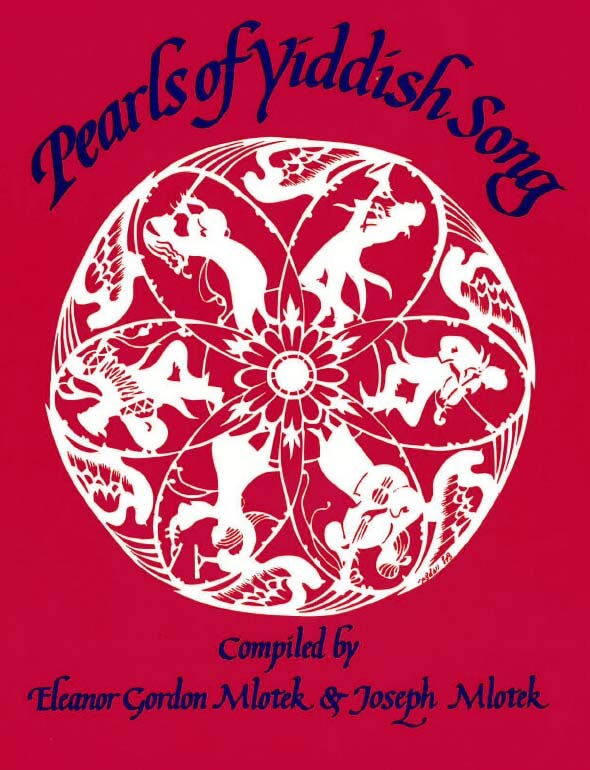Part of a popular lullaby with satiric undertones that is included in many collections as an anonymous folksong. Actually written by Maskillic writer Mikhl Gordon (1823-1890), author of song favorites “Di bord” (The beard) and “Di mashke” (Whiskey) and others. Originally published in 1888 in the author’s anonymous collection. Textual variant published in 1901 by S. Ginsburg and P. Marek; text and music published in 1909 by Joel Engel. The whole poem was reprinted in 1974 by Yosl and Chana Mlotek.

If I had the emperor’s treasures
along with his whole empire,
they would not be as nearly as dear to me
as you are,
my light, my shine.
When I see you
it seems to me as though
the whole world is mine.
Sleep my child, sleep my child,
may you rest and be well.
Your father did not teach his child
what God commanded,
so in the world to come
he will be roasted and burned.
But you, my child, with your saintliness, may your efforts
draw your father out from hell.
Sleep my child, sleep my child,
may you live long and be well.
When, one day, I must go to that world,
the gates of paradise will be open for me.
And you, my child, may you be devout and good,
so they will say in the world to come:
“Let the saint’s mother in!”
Sleep my child, sleep my child,
may you live long and be well.
Az ikh volt gehat dem keysers oytsres
Mit zayn gantser melikhe,*
Volt dos gornisht zayn bay mir nikhe,
Vi du bist bay mir nikhe,
Mayn likht, mayn shayn,
Az lkh derze dikh,
Dukht zikh mir
Di gantse velt is mayn.
Shlof, mayn kind, shlof, mayn kind,
Zolst mir ruen un zayn gezint.
Der tate hot dos kind nit gelernt
Vos got hot gebotn,
Vet men im oyf yener velt
Brenen un brotn.
Un du, mayn kind, mit dayn tsidkes
zolst zikh mien
Dayn tatn fun gehenem aroystsutsien.
Shlof, mayn kind, shlof, mayn kind,
Zolst lang lebn un zayn gezint!
Az ikh vel a mol darfn
Oyf yener velt geyn,
Veln di tirn fun gan-eydn
Ofn shteyn.
Un du, mayn kind, zolst zayn a frumer
Un a guter,
Vet men zogn oyf yener velt:
Lozt arayn dem tsadiks muter!
Shlof, mayn kind, shlof, mayn kind,
Zolst lang lebn un zayn gezint!
*melukhe
אַז איך װאָלט געהאַט דעם קיסרס אוצרות
מיט זײַן גאַנצער מלוכה,
װאָלט דאָס גאָרנישט זײַן בײַ מיר אַזױ ניחא,
װי דו ביסט בײַ מיר ניחא,
מײַן ליכט, מײַן שײַן,
אַז איך דערזע דיך.
דוכט זיך מיר
די גאַנצע װעלט איז מײַן.
שלאָף, מײַן קינד, שלאָף, מײַן קינד,
זאָלסט מיר רוען און זײַן געזינט.
דער טאַטע האָט דאָס קינד ניט געלערנט
װאָס גאָט האָט געבאָטן,
װעט מען אים אױף יענער װעלט
ברענען און בראָטן.
און דו, מײַן קינד, מיט דײַן צדקות
זאָלסט זיך מיִען
דײַן טאַטן פֿון גיהנום אַרױסצוציִען.
שלאָף, מײַן קינד, שלאָף, מײַן קינד,
זאָלסט לאַנג לעבן און זײַן געזינט!
אַז איך װעל אַ מאָל דאַרפֿן
אױף יענער װעלט גײן
װעלן די טירן פֿון גן־עדן
אָפֿן שטײן.
און דו, מײַן קינד, זאָלסט זײַן אַ פֿרומער
און אַ גוטער,
װעט מען זאָגן אױף יענער װעלט:
לאָזט אַרײַן דעם צדיקס מוטער!
שלאָף, מײַן קינד, שלאָף, מײַן קינד,
זאָלסט לאַנג לעבן און זײַן געזינט!
Song Title: Az Ikh Volt Gehat Dem Keysers Oytsres

First published in 1988 as Pearls of Yiddish Song: Favorite Folk, Art and Theatre Songs, this anthology contains 115 songs. Some material had never been published, while others, included in rare song collections or sheet music, were largely inaccessible. The songs presented reflect Jewish life in Eastern Europe and the United States and depict childhood, love, family celebrations, poverty, work and struggle. There are also songs from the Hasidic and Maskilic movements, songs of Zion and of America, as well as songs from the Yiddish theater.
The title of this anthology derives from the weekly two-page feature column “Pearls of Yiddish Poetry,” which the compilers Yosl and Chana Mlotek initiated in 1970 in the Yiddish newspaper Der Forvertz (the Yiddish Daily Forward). Hundreds of readers from around the world — including authors, composers, singers, actors — became co-participants in this collective folk project and recalled melodies, lines, fragments, stanzas and their variants of songs, poems, and plays which they had heard in their youth. At first, readers sent in only written material. Later, they also taped songs on cassettes, many of whose melodies had, until then, never been recorded. They also identified and supplied missing information regarding lyricists, poets, and composers and described the circumstances surrounding the songs’ origins, their dissemination, diffusion and impact.